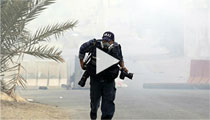President Goodluck Jonathan struggled to maintain stability as Boko Haram, an Islamist militant group based in northern Nigeria, carried out a wave of terrorist attacks against churches, government buildings, and, for the first time, news outlets. In April, the group staged coordinated attacks on offices of three newspapers in two cities, and threatened reprisals against 14 news outlets it accused of misrepresenting its activities. The threats forced many journalists to relocate from northern Nigeria. The press corps also faced persistent harassment at the hands of the government: CPJ documented more than 100 assaults, cases of obstruction, and other anti-press actions by security forces and officials. Jonathan also came under fire for his decision to suspend consumer fuel subsidies, which prompted a nationwide strike and street protests in this top oil-producing nation. Protesters surrounded the studios of the national public broadcaster Nigerian Television Authority and the private Africa Independent Television, two prominent outlets seen as pro-government, to demand more coverage of their concerns. The anger spread to social media with the #OccupyNigeria hashtag trending globally on Twitter.
Nigeria
» Press faces a severe new threat from Boko Haram.
» Journalist murders on the rise; government fails to bring justice.
President Goodluck Jonathan struggled to maintain stability as Boko Haram, an Islamist militant group based in northern Nigeria, carried out a wave of terrorist attacks against churches, government buildings, and, for the first time, news outlets. In April, the group staged coordinated attacks on offices of three newspapers in two cities, and threatened reprisals against 14 news outlets it accused of misrepresenting its activities. The threats forced many journalists to relocate from northern Nigeria. The press corps also faced persistent harassment at the hands of the government: CPJ documented more than 100 assaults, cases of obstruction, and other anti-press actions by security forces and officials. Jonathan also came under fire for his decision to suspend consumer fuel subsidies, which prompted a nationwide strike and street protests in this top oil-producing nation. Protesters surrounded the studios of the national public broadcaster Nigerian Television Authority and the private Africa Independent Television, two prominent outlets seen as pro-government, to demand more coverage of their concerns. The anger spread to social media with the #OccupyNigeria hashtag trending globally on Twitter.
Though Boko Haram posed the most severe threats against the press, government officials and security forces accounted for more than three-quarters of the anti-press attacks documented by CPJ through December 31, 2012.
| 113 | Government, security forces |
| 23 | Boko Haram |
| 2 | Niger Delta militants |
| 5 | Others (civilians and unidentified) |
On April 26, a suicide bomber rammed an explosives-packed vehicle into the offices of the daily ThisDay in the capital, Abuja, while another attacker detonated bombs at a building housing the offices of ThisDay, The Sun, and The Moment in the northern city of Kaduna. Boko Haram claimed responsibility for the attacks and justified them by accusing the Nigerian press of misrepresenting its activities, according to news reports.
October 19, 1986: | Parcel bomb kills Dele Giwa, editor of NewsWatch. |
December 24, 2010: | Explosion kills Augustine Sindyi, a photographer for the state-owned weekly Standard newspaper, as he walks home from work. |
April 26, 2012: | Suicide bomber attacks ThisDay offices in Abuja. |
April 26, 2012: | Bomber attacks offices of ThisDay, The Sun, and The Moment in the northern city of Kaduna. |
In a chilling video released shortly after the April 26 attacks, Boko Haram accused local and international news outlets of "offenses detrimental to Islam," in their reporting and vowed to "take revenge."
| 11 | Local outlets |
| 3 | International outlets |
| LOCAL | INTERNATIONAL | ||
| ThisDay Punch Daily Sun Vanguard | Guardian Nation Tribune National Accord | Leadership Daily Trust Peoples Daily | Radio France Internationale SaharaReporters VOA Hausa-language service |
Illustrating the rise of deadly anti-press violence in Nigeria, unidentified gunmen shot reporter Enenche Akogwu of independent Channels TV as he reported on the aftermath of terrorist attacks in the northern city of Kano. No suspects were arrested in the case, the latest in a string of five unsolved journalist murders since 2009, CPJ research shows.

